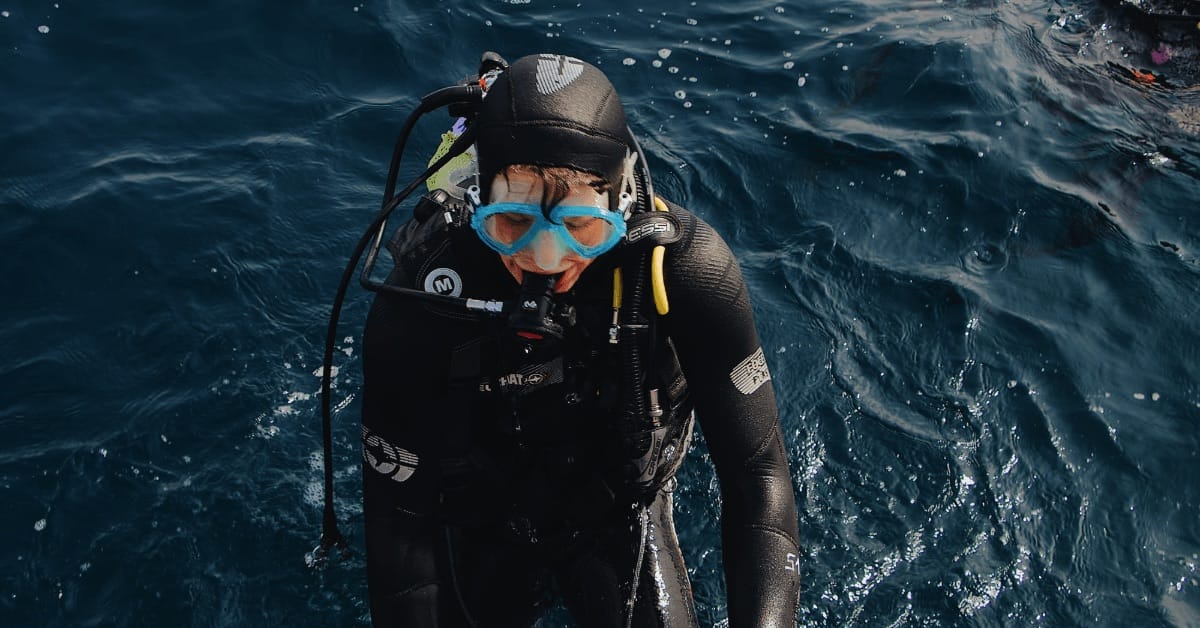
Your PADI Diver Training will have given you the principles of diving, built your confidence, and practical experience. You know what kind of accidents could happen and most importantly, you know how to avoid them in the first place.
So now it’s down to you to follow some simple guidelines and make sure you keep not only yourself safe but also your dive buddies.
Breathe at all times
Whilst it may be a natural reaction to hold your breath underwater, it can be extremely dangerous, even fatal. It is one of the first things you learn in your basic training, and one thing you must always remember. Afterall, the slower and more controlled your breathing, the more you will be in control of your dive and the more relaxed and enjoyable it will be.
Always Check your Equipment
First, make sure you have the right equipment for your dive. Remember if you need a prescription scuba diving mask, so that you don’t have to wear your glasses underwater, we can provide you with this. Different dive centres may require slightly different equipment, so if in doubt, just ask. Then, make sure your equipment is working as it should. Complete your buddy-check too because if either of you have a malfunction, it will cause problems for you both. Being prepared will mean you are more relaxed, so don’t turn up late and then hold everyone up whilst you have to go through your equipment checks – you will not make friends that way!
Keep Learning
Yes, you may have completed your open-water qualification and think you are safe to dive anywhere but, realistically, every day’s a school day. Taking advice and guidance from dive masters and instructors, learning from your own experiences, and keeping your knowledge up to date will keep you interested and stand you in good stead. And make the most of different courses on offer to continually widen your experience – at your own pace though, whenever you are ready to move on.
Keep Diving
Diving regularly and keeping your skills up to date will give you a better chance of enjoying every dive safely. Knowing what to do in an emergency, performing other key skills and even the basics, such as mask clearing, buoyancy control and buddy-check can never be practiced enough if you are to stay safe each time you enter the water.
Stay Fit and Healthy
We know that swimming requires a level of fitness, but scuba diving is more strenuous as you can be diving in strong currents, carrying heavy equipment and need to be able to breathe correctly. If you overstretch and overexert your body, this can lead to all kinds of injury and cause accidents. It is fair to say that obesity, alcohol, smoking and tiredness can all cause decompression sickness, and other problems which could be avoided.
Come Up Slowly
We have already mentioned how important it is to keep your breathing regular, and it is vitally important to ascend slowly and safely (simple tip: ascend slower than the line of bubbles every time you exhale) to avoid decompression sickness.
Know Your Limits
Never let yourself be put in a position where you are out of your comfort zone. If it feels wrong, then don’t do it. Never go beyond your training limits, nor what you are physically or mentally capable of. Your dive buddies would far rather you pulled out of a dive than put yourself or anyone else in any danger.
Check your buoyancy at the surface
Always check your buoyancy at the start of the dive, and then a positive buoyancy at the end of every dive will prevent any problems arising if other divers are in trouble. Inflate your BCD, if necessary, drop your weights and relax! Conserving your energy and taking the time to float naturally now will round off your overall experience perfectly!
Stay Safe and Enjoy
Remember your training, be well prepared, work with your dive buddies and just breathe gently through your own little underwater extravaganza!
Your diving experience will get better and better every time, provided you stick to the guidance for safe scuba diving and protect the underwater environment. Make sure you see every bit of it in the best light too with the right mask for you – stay safe and enjoy! More information on our prescription scuba diving masks can be found here.